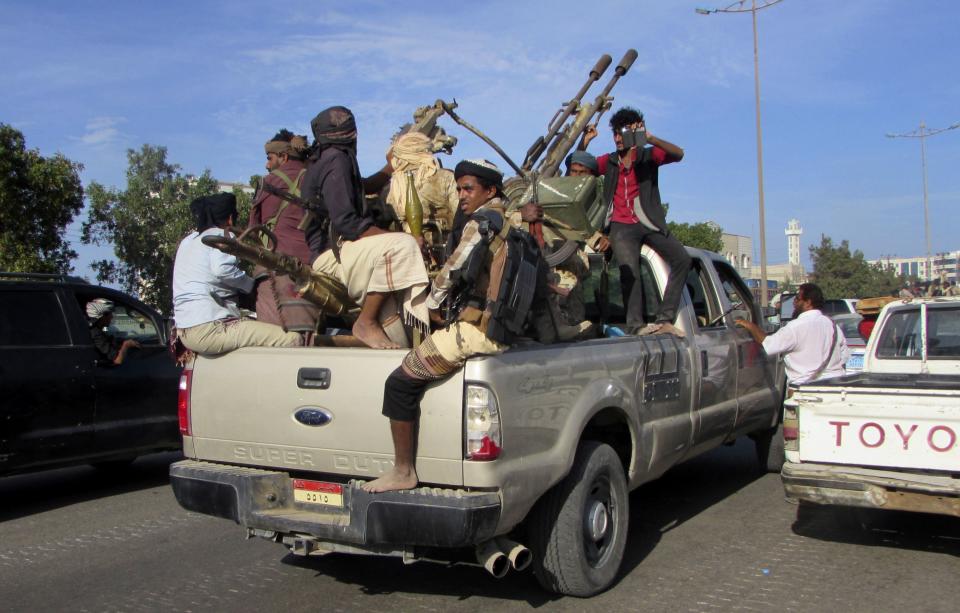The Spreading Persian Empire
"There are great fears that plans are underway for Aden to meet the same fate as Sanaa."
"They [Iranian-backed Shiite Yemenite Houthi rebels] want to extend their reach on both the ground and on the coast."
Nayef al-Bakry, Aden deputy governor
 |
| In this photo taken Thursday, March 19, 2015, militiamen loyal to President Abed Rabbo Mansour Hadi ride on an army vehicle while patrolling a street in Aden, Yemen. The city is visibly expecting assault, whether from the forces of Hadi’s rival, ousted President Ali Abdullah Saleh, who has allied himself with the Shite rebels, or from al-Qaida militants. (AP Photo/Yassir Hassan) |
The legitimate president of Yemen, Abed Rabbo Mansour Hadi, now rules a divided country. And he rules alongside another president, Ali Abdullah Saleh, an autocrat who was president of the North African country since 1978, but who was ousted in Yemen's version of its Arab Spring, in 2011. Saleh remained in Yemen, buoyed by loyalists in the government, in the military, and when the Houthis marched on the capital Sanaa, he aligned himself with them, to once again take over the presidency.
Since taking flight from Sanaa, President Hadi spoke of the rebel takeover as "a coup against constitutional legitimacy", and since Sanaa was now in the hands of the rebellious Houthi with Saleh president once again, he declared Aden the new "temporary capital". There is some obvious similarity with divided capitals in Libya, post Gadhaffi, yet another egregiously failed Arab Spring revolution which has led not to liberty and democracy but to wild Islamist chaos, echoed in Syria and Iraq.
But all is not calm in Aden, the city anticipating an assault, to unify the country under the Houthis. Nothing, however, is ever simple in the Middle East. Al-Qaeda is well established in Yemen, and its militias have been fighting the Houthi militias throughout the country. Into that toxic brew add the Islamic State of Iraq and Al-Sham. Which has claimed credit for the bombing of two Shia mosques in Sanaa killing over 130, wounding hundreds more.
And here is the spectre of a legitimate government with broad international support, ousted by a rebellious sectarian demographic supported by the Islamic Republic of Iran, with al-Qaeda and Islamic State competing with one another to destroy both the legitimate government and the upstart government of Iran's spreading empire. And it is spreading, from Syria to Iraq, Libya to Lebanon, Yemen to North Korea and Venezuela.
And so, Aden is preparing to meet its fate. While al-Qaeda has captured a city on Aden's flank, the capital of Lahj province, giving it a position 20 kilometres from Aden, it is the planned military approach of the Houthi rebels who appear the most imminently likely to march on the city. Army and police forces whose loyalty is to President Hadi, along with allied militia, now patrol Aden's streets, manning checkpoints.
Tanks have been put in place guarding roads leading to the city, while children are kept home from school in reasonable fear for their safety. Police commandos whose loyalty is to Saleh attempted to capture the airport and President Hadi's forces fended them off. They did succeed in capturing Yemen's third largest city, in what officials fear presents as a prelude to an Aden attack.
The capture of Taiz, considered the "gateway to the south", by the Houthis, came in the wake of a column of armoured fighting vehicles and truckloads of Shiite fighters and pro-Saleh troops.
In all of this disorder where is the United Nations Human Rights Council -- currently set to probe Israel's foray into Gaza resulting in the deaths of Palestinians whom Hamas uses as a shield for their attacks on Israel -- in what might be expected as a condemnation of the Republic of Iran's meddling in the affairs of Yemen?
Labels: al--Qaeda, Conflict, Iran, Islamic State, Shiite, Yemen

<< Home